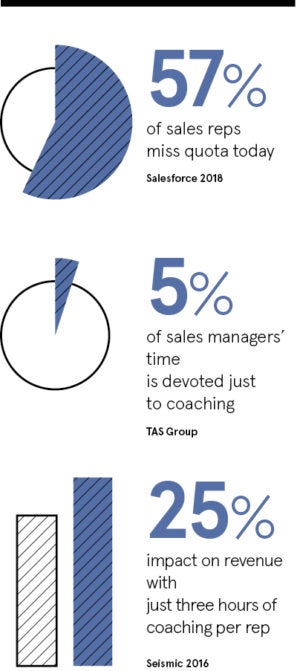For many years, business sales teams have been dominated by individuals understood to have the “gift of the gab” and a natural ability to persuade prospects to part with their cash. The remaining nearly six in ten salespeople expect they will fail to hit their quota, according to Salesforce research, and businesses often cannot identify the root cause.
Artificial intelligence (AI) is enabling those organisations to unlock much more of the true potential of their staff, by identifying what works among the top performers, highlighting the key moments revenue is won and lost, and teaching the middle band of the team how to apply the lessons.
“It’s not uncommon for companies to rely on just 10 to 20 per cent of their sales staff to deliver half their revenues,” says Kevin Beales, founder of Refract, which has created an AI-enabled sales-coaching platform. “An understanding of sales conversations helps to get middle-performing salespeople much closer to top performers on a consistent basis and does the heavy lifting to help managers coach sales teams.”
Using AI-based coaching, companies can derive detailed analysis on their sales calls, revealing which approaches are likely to be successful and those set to fail. Key data points of interest include talk-listening ratios, how engaged the prospect is, the opportunities that arise, how many questions are asked and what phrases are used, as well as pinpointing key moments such as competitor mentions or commercial negotiation.
 Once interpreted, this information equips companies with details of not just who is getting better results within their sales teams, but also precisely how they are doing so, helping time-poor sales leaders to analyse and influence performance. From that basis, it becomes a great deal easier for new and existing members of a workforce to understand ways to improve.
Once interpreted, this information equips companies with details of not just who is getting better results within their sales teams, but also precisely how they are doing so, helping time-poor sales leaders to analyse and influence performance. From that basis, it becomes a great deal easier for new and existing members of a workforce to understand ways to improve.
“We often see that top performers ask more and better questions on their calls, and they quickly discover more pain and value points for prospects, offering a helpful solution,” explains Mr Beales. “Companies can now take sales meetings, conference calls or demonstrations, surface those key and coachable moments, and share praise, ideas and corrective feedback.”
Given the time and resource drag of coaching, sales teams often do not receive enough guidance. Strikingly, a study by the TAS Group found that sales reps feel they receive around half the amount of coaching that managers believe they are giving. This is despite evidence from Gartner that as little as three hours of dedicated sales coaching a month can deliver a 25 per cent jump in sales revenue.
Among companies transforming performance with AI coaching is customer communications firm Neopost. The business used to download its successful sales calls and attempt to identify patterns. But it now takes insights from calls in the Refract platform, searching for specific phrases, and enabling staff to find out how to listen to customers more and when to capitalise on opportunities and expand on a discussion point.
Meanwhile, ecommerce software firm VisualSoft uses the system to enable sales staff to self-diagnose success and errors, and to identify and even turn around missed opportunities. Other users of Refract’s software include major technology, media, recruitment and financial services organisations.
The whole profession of sales is becoming heavily data driven, so adopting AI coaching is a natural progression. Mr Beales concludes: “Without understanding why sales conversations work or fail, businesses miss out on many opportunities and don’t make the most of their teams. Using AI-driven sales coaching helps jump middle performers to high performance quickly.”
To find out more about unlocking the hidden value in sales conversations please visit refract.ai

